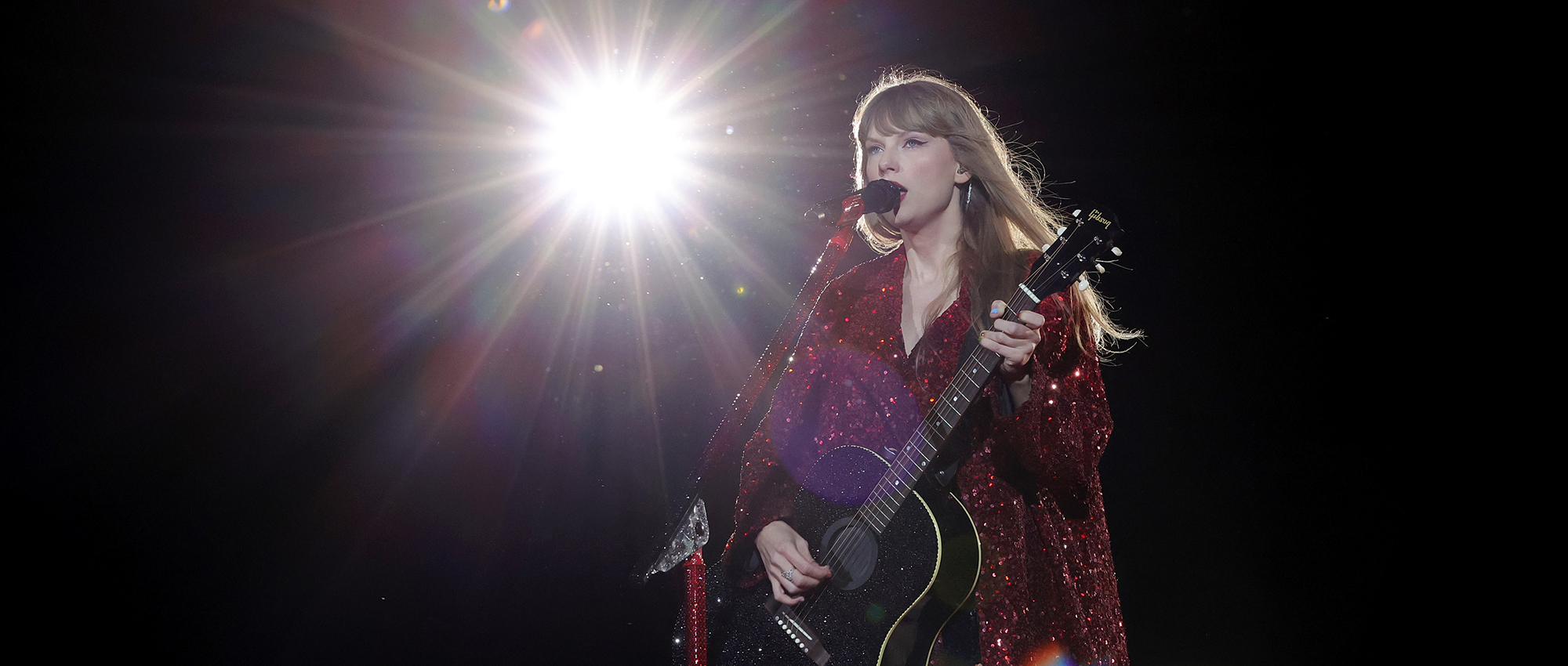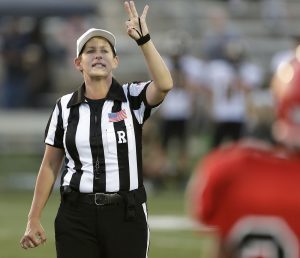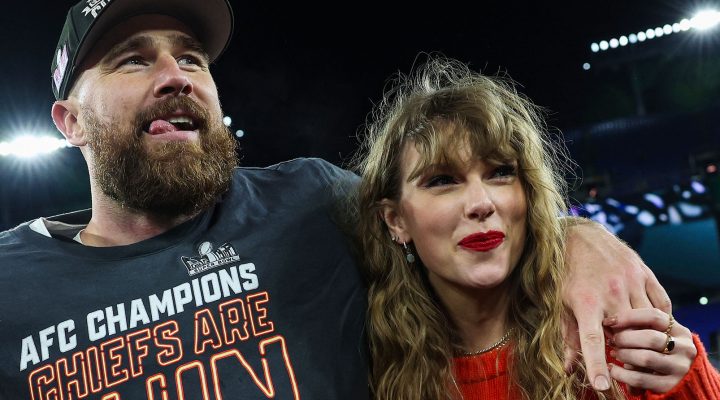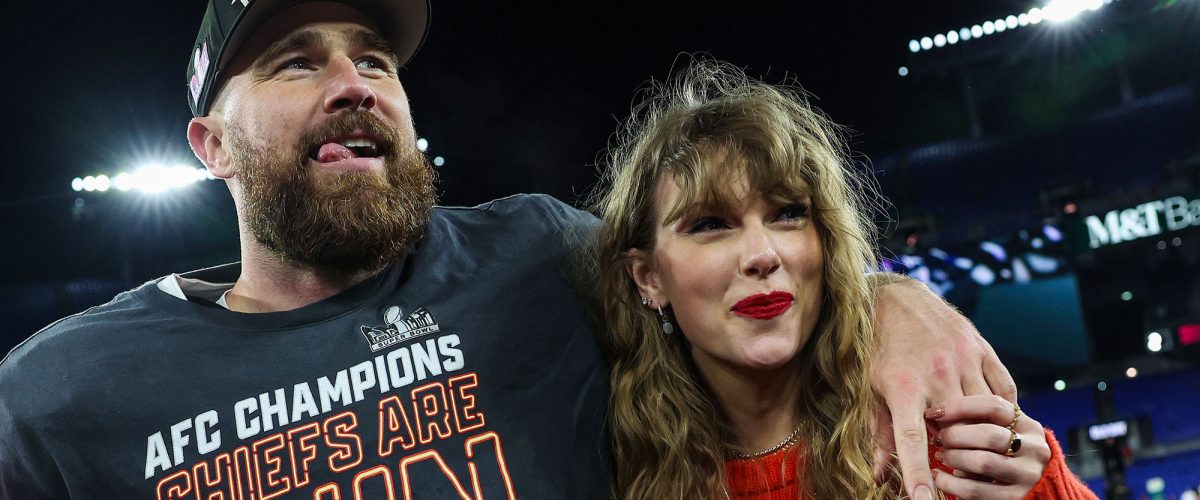The Kansas City Chiefs have booked their fourth trip to the Super Bowl in five years behind the leadership of head coach Andy Reid and quarterback Patrick Mahomes, two of the best individuals ever at their respective roles.
With 269 total wins, Reid has the fifth most wins of any head coach in NFL history. And at just 28 years old, Mahomes is one of four quarterbacks in NFL history with multiple Super Bowl rings and NFL MVP awards.
But the story line that will be on many people’s mind until the Lombardi trophy is hoisted either by the Chiefs or the San Francisco 49ers on Feb. 11 is the dating relationship of Chiefs tight end Travis Kelce and the billionaire global super star Taylor Swift. And surprisingly, it has everything to do with the larger debates in American religion.
‘Holy war’
In America’s deeply divided political culture, the attention Swift is getting due to her boyfriend has made at least one presidential candidate jealous.
Rolling Stone reported Jan. 30 that some in Donald Trump’s campaign have declared “holy war” against Swift — because they fear the pop star will endorse Joe Biden in the 2024 presidential race as she did in 2020.
“A potential Swift appearance at Super Bowl LVIII alongside her boyfriend, Kansas City Chiefs tight end Travis Kelce, has already prompted the MAGA right’s culture-war pugilists into a conspiracy-fueled froth about how this NFL season has been rigged to boost Biden,” Rolling Stone reported.
One official working on the Trump campaign told the magazine Swift is “another left-wing celebrity who is part of the Democrat elite telling you what to think.”
And the magazine added: “Former GOP presidential hopeful and current Trump hype man Vivek Ramaswamy took to Twitter following the latest Chiefs’ playoff win to claim that unnamed forces would rig the Super Bowl to give the as-yet nonexistent endorsement from the ‘artificially culturally propped-up couple” increased visibility.’”

Taylor Swift performs onstage during “Taylor Swift | The Eras Tour” at MetLife Stadium on May 27, 2023, in East Rutherford, New Jersey. (Photo by Kevin Mazur/TAS23/Getty Images for TAS Rights Management)
Love story
For conservative conspiracy theorists, the Kelce-Swift alliance is something far more sinister than a simple love story. Yet the couple tell the story from a different vantage.
In her Time Person of the Year interview, Swift said: “This all started when Travis very adorably put me on blast on his podcast, which I thought was metal as hell. We started hanging out right after that. So we actually had a significant amount of time that no one knew, which I’m grateful for, because we got to get to know each other.”
After Kelce attended Swift’s concert in Kansas City for her Eras tour, rumors began to spread that the two were living their wildest dreams. Kelce recalled on his “New Heights” podcast how he attempted to give a friendship bracelet and his phone number to Swift but had to shake it off when his plan didn’t work.
But rather than handing Kelce a cruel summer, Swift welcomed him to New York for a private hang out. And then in September, she attended her first Chiefs game.
“By the time I went to that first game, we were a couple,” she told Time. “I think some people think that they saw our first date at that game. We would never be psychotic enough to hard launch a first date.”
Taking shots at her like it’s Patrón
During the six hours of game time for the Chiefs playoff games against the Dolphins and Bills, Swift was shown on camera 10 times for a total of one minute and 41 seconds of face time.

A fan displays a sign for Taylor Swift during the third quarter in the AFC Championship Game between the Baltimore Ravens and the Kansas City Chiefs at M&T Bank Stadium on January 28 in Baltimore,. (Photo by Rob Carr/Getty Images)
Her appearances have led to unprecedented ratings for the NFL. Ninety-three of 2023’s top 100 television shows were NFL games. Virginia Tech professor Anthony Amey says, “There’s no question in my mind Taylor Swift helped make that possible.” Much of the increase in viewers comes from young women, despite Gen Z being notoriously uninterested in watching live sports.
But not everyone is enchanted.
In one of her most well-known songs that now seems somewhat prophetic, Swift sings, “And I can see you years from now in a bar talking over a football game with that same big, loud opinion … drunk and grumbling on about how I can’t sing.”
As the sparks fly between Swift and Kelce, bad blood has formed between some delicate NFL fans and the fearless couple. And it’s not just mean fans who are copping out by saying it in anonymous tweets.

Tony Dungy smiles on field before an NFL football game between the Buffalo Bills and the Miami Dolphins, Sunday, Jan. 7, 2024, in Miami Gardens, Fla. (AP Photo/Doug Murray)
When asked about Taylor Swift, NFL Hall of Fame coach Tony Dungy, who is an outspoken conservative evangelical, told Fox News: “That’s the thing that’s disenchanting people with sports now. There’s so much on the outside coming in. Entertainment value and different things that’s taking away from what really happens on the field.”
Comedian Jo Koy joked during his opening monologue at the Golden Globes: “The big difference between the Golden Globes and the NFL — on the Golden Globes we have fewer camera shots to Taylor Swift.”
ESPN’s Stephen A. Smith came to Swift’s defense. “It’s getting ridiculous how she’s being criticized by some, insulted by others, blamed by many,” Smith said on The Stephen A. Smith Show. “In the case of Tony Dungy, it’s like come on man, can we stop this, sir? Love Tony Dungy. … But you’re blaming Taylor Swift for disinterest in NFL action? What are we talking about? Let her live her life.”
Champagne problems
At one point during the AFC championship game against the Ravens, when the camera was showing her for an extended moment during an ad for the Grammy’s, Swift appeared to be watching the broadcast and mouthing the words, “Go away, please.”
Of course, when we’re talking about the champagne problems of pop stars, it’s easy to roll our eyes and say everyone needs to calm down and tolerate it. But believe it or not, there’s more to this story than the NFL’s gold rush of Taylor Swift.
Over the past decade, the reputation of the NFL has taken a number of hits among its biggest fans — conservative men who don’t like hearing women, submitting to women, having their racism called out or losing their enjoyment of violence.
If I were a man
When I first heard a female play-by-play announcer during a football game, someone else in the room said: “Women need to stay out of men’s sports. Let men have their space.”
“‘It has nothing to do with you being a woman,’ they tell me, ‘I just can’t stand the sound of your voice.’”
A few years later, when I was listening to sports talk radio, the host said he didn’t want to hear a woman’s voice while watching football.
These opinions are held by more than those two people.
Sports journalist Julie Dicaro says she’s heard people describe female announcers as “shrill, grating, like listening to my ex nag me,” and “sounds like my mom yelling at me.”
“Women in sports broadcasting are used to men criticizing their voices,” she said. “In my three years in sports radio, I’ve had more men complain about my voice than everything else about me combined.”
Of course, the men claim not to be sexist. According to Dicaro, “‘It has nothing to do with you being a woman,’ they tell me, ‘I just can’t stand the sound of your voice.’”

ON Saturday, July 29, 2017, broadcaster Beth Mowins chats with a reporter while watching the Denver Broncos run through drills at NFL football training camp in Englewood, Colo. She would become the first woman since 1987 to be the lead announcer on a nationally televised, regular season NFL game. (AP Photo/David Zalubowski)
Dicaro recalls how when Beth Mowins became the first woman to call a Monday Night Football game, “Twitter lit up with complaints about her voice.”
Andrea Kremer, who with Hannah Storm was part of the first all-female broadcast team for a major men’s sporting event, added, “I have no doubt that ‘hating the sound of her voice’ is code for ‘I hate that there was a woman announcing football.”
Rebecca Martinez, a professor of women’s and gender studies at the University of Missouri, agrees. “The negative online reaction to Mowins’ play-by-play calling football games is steeped in sexism,” she said. “The comments, mostly from men, have focused on her voice being annoying to the point of not wanting to listen to her. They’ll focus on the naturally higher pitch of women’s voices and ‘shrillness,’ all the while claiming their critiques of higher pitch have nothing to do with sexism. Women who have high visibility, particularly in settings that are traditionally male, will experience backlash.”
Call it what you want
In addition to whining about women’s voices, conservative male football fans also complain about female refs calling games. When Shannon Eastin became the first woman to officiate an NFL game in 2012, men complained.

Referee Shannon Eastin makes a call at the International Women’s Football League Championships, Saturday, July 26, 2014, at District Three Stadium in Rock Hill, S.C. (Bob Leverone/AP Images for National Football League)
Eastin told Eliza Murphy of ABC News: “Knowing that I’m a female in a man’s world, I’ve always put the most pressure on myself. Pretty much everything I do is going to be magnified. I know what I signed up for. I have to be bigger, stronger, know that I understand the rules. I have to do things even better than the men that are working. And I’m OK with that.”
But the challenges women face regarding officiating men’s sports go beyond simply the NFL. When US Soccer had a female official for a game in 2018, Ex-USMNT captain Claudio Reyna fussed in an email: “Can we get real and have male refs for a game like this? It’s embarrassing guys. What are we trying to prove?”
A writer for American Thinker dedicated their final article of 2023 to complaining about female refs. “If these women must obey the DIE imperatives by imposing themselves on men’s soccer, then at least do it behind the scenes as a video assistant referee. There, they’ll be in cozy offices, comfortably secluded from the action — and not getting their caboose in the way.”
There goes the last great American dynasty
Unfortunately, the way conservative men treat women tends to mirror the way they treat others as well, such as Black men.
When former San Francisco 49ers quarterback Colin Kaepernick decided to kneel during the National Anthem to protest police brutality and social injustice against people of color, Trump — then president — fired back, “Wouldn’t you love to see one of these NFL owners, when somebody disrespects our flag, to say, ‘Get that son of a b**** off the field right now – he’s fired!'”
Kevin Jackson celebrated Trump’s words on Fox & Friends Weekend at the time, predicting: “I think the reaction’s going to be the same thing that happened with immigration, the same thing that happened with health care, the same that happens whenever Donald Trump decides he’s going to finally call somebody out because what this guy has been able to do is tap into essentially the pulse of America on practically every issue.”
Just like Dungy blamed disenchantment with today’s NFL on Taylor Swift, Jackson blamed it on Kaepernick. “The NFL ratings are in the tank, and there’s a reason for that. I call it the ‘Kaepernick Effect,’” he said.
Thus, to conservative men, what they believe they’ve lost is a pure America, a dynasty of white male power, unsoiled by the social concerns of non-white men.
I love the players and you love the game
Alongside the complaints against women’s voices, women’s authority and Black men’s peaceful protests in the NFL over the past decade have been complaints over the NFL growing too soft.
With the rise of awareness about traumatic brain injuries, the NFL has strengthened its rules against violent hits. Whether the NFL is doing so for financial reasons or out of a genuine concern for the players can be debated. But many players and fans miss the violence.
Ashley Dunkak documented for CBS News a decade ago how players were complaining about the NFL’s promotion of safety, with one saying: “Football’s a violent game. I don’t think you can ever make hitting somebody soft. It’s just ridiculous.”
Since then, the restrictions and fines against violence have gotten even stronger. On one hand, many football fans miss the days Dunkak recalls when analysts like Tom Jackson and Chris Berman celebrated highlights of players being violently hit by yelling, “He got … JACKED UP!” There can be a nostalgic longing among many football fans for the game of their past. But on the other hand, the players are people with real lives and brains that are being traumatized from the violence of the game.
‘I hope you think of me’
According to Andrew Dzurisin, a sociology professor at Middlesex County College, “Of the major sports, football is seen as the one that fits the traditional definition of masculinity. It’s rough, it’s violent, it’s tribal, it’s a ‘man’s’ game.”
“To hear a woman do the play-by-play of the sport that most fits the traditional definition of masculinity is beyond comprehension to some men.”
He says, “To hear a woman do the play-by-play of the sport that most fits the traditional definition of masculinity is beyond comprehension to some men.”
While there may be overlap in the people who complain about Taylor Swift being seen, women announcing, women officiating, Black men peacefully protesting, and the lack of violence at NFL games, the cultural outcry could not be more clear. There is a notable culture of men who don’t want to hear women, submit to women or be reminded of our nation’s problems with racial injustice. And they really want to celebrate violence.
So what does all of this have to do with American religion?
Conservative evangelicals are always talking about progressives caving to “the culture.” But the culture in American sports doesn’t want women to talk or have authority, doesn’t want social justice discussed, and wants violence celebrated.
Those are literally the tenets of conservative evangelicalism, even as they fuss about pop stars like Taylor Swift.
So when we think about “caving to the culture,” and when we read people complaining about the NFL showing Taylor Swift for a combined minute of a 3.5-hour broadcast, we should think about conservative evangelicalism. Today’s conservative evangelicals are the ones who are caving to pop culture.
Trey Ferguson, author of Theologizin’ Bigger, recently put it this way: “I ain’t met a Christian who was worried about ‘caving to the culture’ whose worldview wasn’t already entirely compatible with ‘the culture.’
“Pro misogyny/patriarchy. Just like the culture. Anti-queer. Just like the culture. Reinforcing the status quo. Just like the culture.”
Rick Pidcock is a 2004 graduate of Bob Jones University, with a Bachelor of Arts degree in Bible. He’s a freelance writer based in South Carolina and a former Clemons Fellow with BNG. He completed a Master of Arts degree in worship from Northern Seminary. He is a stay-at-home father of five children and produces music under the artist name Provoke Wonder. Follow his blog at www.rickpidcock.com.
Related articles:
What grief, denial and fear have to do with the evangelical fascination with Trump | Analysis by Rick Pidcock
What I learned from Taylor Swift | Opinion by Bill Wilson
We face a cultural crisis, not just a political one | Opinion by David Gushee


